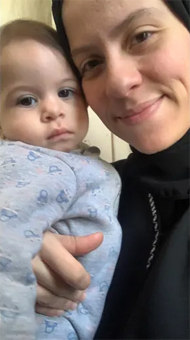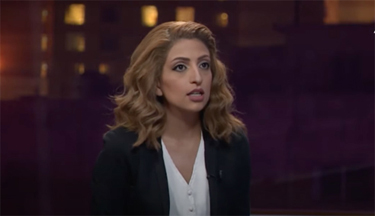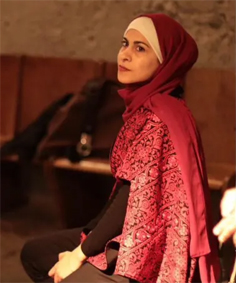|
CRY FREEDOM.net
formerly known as
Women's Liberation Front
MORE INSIGHT MORE LIFE
Welcome to cryfreedom.net,
formerly known as Womens
Liberation Front.
A website
that hopes to draw and keeps your attention for both the global 21th. century 3rd. feminist revolution as well
as especially for the Zan, Zendegi, Azadi uprising in Iran and the
struggles of our sisters in other parts of the Middle East. This online magazine
that started December 2019 will
be published every week. Thank you for your time and interest.
Gino d'Artali
indept investigative
journalist
radical feminist and women's rights activist
'WOMEN, LIFE, FREEDOM'
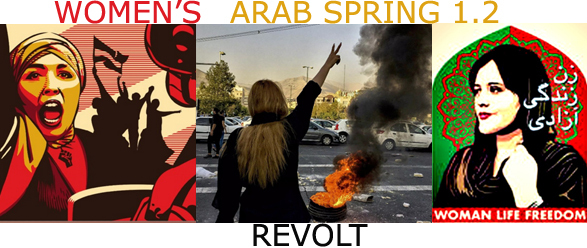
You are now at the section on what is happening in the rest of the Middle
east
(Updates
August 1, 2024)
Click here for the
Iran 'Woman, Life, Freedom' section
Updated July 26, 2024
For the 'Women's Arab Spring 1.2' Revolt
news
click here
Updated July 29, 2024
CLICK HERE ON HOW TO READ
ALL ON THIS PAGE
|
SPECIAL
REPORTS PALESTINE
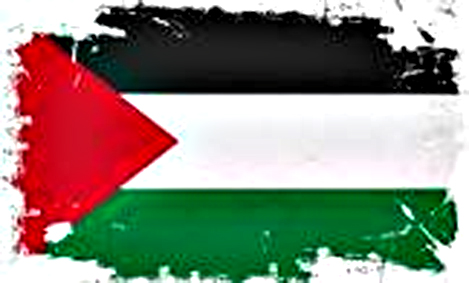
FROM THE RIVER TO THE SEA - FREE PALESTINE
July wk4 P3 --
July wk4 P4/2-- July
wk4P4 -- July
wk4 P3 -- July
wk4 P2 --
Click here for an overview by week in 2024
|
July 31 - 30, 2024
Food for thought by Gino
d'Artali:
"One down
yes but hundreds of thousands are still 'swimming
from the river to the sea' and they'll not be stopped.
and more actual news
"Tyrants and killers are of all times. And always
thinking the highest of themselves.
But in the the end they always fall." Mahatma Ghandi |
July 30 - 27, 2024
Again and not sopping
utill justice is served:
"International Court of Justice declared Israel's
occupation of Palestinian territory <unlawful> and ruled
that Israel is <under an obligation to bring to an end
its unlawful presence (...) as rapidly as possible."
and more actual news below
Read the latest news below. |
July 26 - 25, 2024
"What I know is
that
living
means fighting under a clear sky
for the love of children."
Click here to go throughout July
and earler, 2024 |
When one hurts or kills a women
one hurts or kills hummanity and is an antrocitie.
Gino d'Artali
and: My mother (1931-1997) always said to me <Mi
figlio, non esistono notizie <vecchie> perche puoi imparare qualcosa da
qualsiasi notizia.> Translated: <My son, there is no such thing as so
called 'old' news because you can learn something from any news.>
Gianna d'Artali.
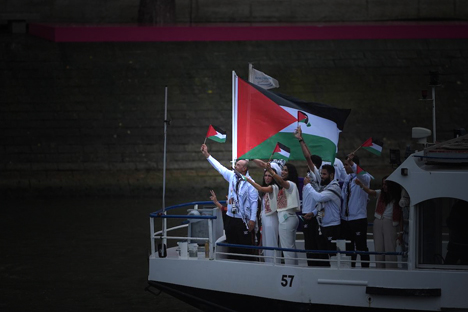
Le Monde - July 31, 2024 - By Jean-Philippe Remy (Jerusalem (Israel)
correspondent), Helene Sallon (Beirut (Lebanon) correspondent) and
Ghazal Golshiri
<<Two Israeli strikes in Beirut and Tehran reshuffle cards of conflicts
with Hamas and Hezbollah
Hamas leader Ismail Haniyeh was killed in Tehran on Wednesday, in an
operation attributed to Israel by Iran. Earlier, Israel had claimed
responsibility for a strike in Beirut targeting Fouad Shukur, a
Hezbollah commander. Over the course of one night, two high-level
killings carried out from a distance in two capitals, Beirut and Tehran,
represented a show of force by the Israeli army and risked transforming
the situation in the Middle East in an unpredictable way. The first,
late on Tuesday, July 30, was carried out by Israeli fighter jets and
targeted 62-year-old Fouad Shukur, one of Hezbollah's most senior
military officers, based in Lebanon. Shortly before 8 pm on Tuesday,
several strikes hit the top floor of an apartment building in the
southern suburbs of Beirut, a Hezbollah stronghold, destroying part of
the building. These strikes killed a woman and two children, and wounded
at least 74 people in the surrounding area, according to an initial
assessment by the Lebanese Ministry of Health. By Wednesday morning,
Hezbollah had still not confirmed the death of Shukur. A <vicious and
criminal action,> reacted Iranian Foreign Ministry spokesman Nasser
Kanaani, whose country is a sponsor of the Lebanese movement. Lebanese
Prime Minister Najib Mikati denounced the <blatant Israeli aggression>
and <criminal act.> For its part, the Israeli army claimed to have
eliminated the man it presented as the <right-hand man> of Hezbollah
leader Hassan Nasrallah, in charge of the precision missile project, and
responsible for the attack on the Druze town of Majdal Shams, on the
occupied Golan Heights, where a Falaq rocket fired on Saturday at this
Druze village caused the death of 12 boys and girls, aged between 10 and
16, on a football pitch. This was the highest number of civilian
casualties in the territory annexed by Israel in 1981 since Hezbollah
began exchanging fire with Israel on October 8, 2023, in the wake of the
Hamas attack on Israel. In a rare move, Hezbollah refused to accept
responsibility for the strike, signaling its leaders' embarrassment at
the number of casualties that could escalate into regional conflict.
Israeli army spokesman Daniel Hagari said Israel wanted to avoid any
<wider conflict> with Hezbollah, but that its forces were ready for <all
scenarios.> The second assassination, which took place late at night,
targeted Ismail Haniyeh, the head of Hamas's Qatar-based political
bureau, in Tehran. As of Wednesday morning, this attack had not been
claimed by Israel. "[Our] brother, the leader, the mujahid Ismail
Haniyeh, the head of the movement, died in a Zionist raid on his
residence in Tehran after attending the inauguration of the new Iranian
president," Hamas said in a statement. The Revolutionary Guards, Iran's
ideological army, also announced in a statement that Haniyeh and one of
his bodyguards had been killed in an attack on a residence in Tehran.>>
Read more here:
https://www.lemonde.fr/en/international/article/2024/07/31/two-israeli-strikes-in-beirut-and-tehran-reshuffle-cards-of-conflicts-with-hamas-and-hezbollah_6705922_4.html
BBC - July 31, 2024
<<The Palestinians heading to Paris to represent their people
Valerie Tarazi is proud to represent Palestinians at the Olympics
As she put in some last practice lengths in Paris last week,
Palestinian-American swimmer Valerie Tarazi thought back to her moment
of inspiration: watching the legendary Michael Phelps winning eight
golds in Beijing in 2008. "That was like my first like, 'Oh my gosh, I
want to be an Olympian'," she said. Paris is a dream come true, as it is
for countless athletes taking to sport's biggest stage. But after more
than nine months of war in Gaza and the deaths of tens of thousands of
Palestinians, Tarazi says her participation is also an act of
commemoration. "It's me honouring them," she said. A child of the huge
Palestinian diaspora, Tarazi, who swims in the 200m individual medley
next Friday, was born and raised in the US. But she celebrates her
connections to one of Gaza's oldest Christian families. Valerie says
news of bombings in Gaza takes its toll on Palestinian athletes
She says four members of her extended family were killed when a church
was hit during intense Israeli bombing last December. "It takes a toll
on us," she said of Gaza's rising death toll, which is now approaching
40,000. "This is our friends, our family, our teammates or national team
members," she said. The International Olympic Committee has recognised
the state of Palestine since 1995. Three quarters of UN members also now
recognise Palestine, but the US, Britain and the host of this year's
games do not. Despite her punishing training schedule and the sacrifices
needed to compete at this level, Tarazi is acutely aware that she is in
a uniquely privileged position, offered the chance to carry the flag in
the world's greatest sporting jamboree. "My little bit of pain is
absolutely nothing compared to what they have to go through every single
day," she said of her compatriots back home. One of her less fortunate
teammates, Tamer Qaoud, is having a hard time keeping his own sporting
ambitions alive.
Tamer. Tamer dreamed of making the Olympics but he says he was unable to
leave Gaza. His house in Gaza has been destroyed. He and his family have
been forced to move twice during the war. Theyíre now living in a tent
in Deir el-Balah, in the middle of the Gaza Strip. "My dream was to
reach the Olympics," he told the BBC this week. "Unfortunately, due to
the war and circumstances, we couldn't leave Gaza." Qaoud, a 1500 metre
runner, has already represented his country twice. A year ago, at the
Arab Games in Algiers, he wore running spikes for the first time. It was
also the first time he'd ever run on anything other than concrete. In
September, he joined Tarazi at the Asian Games in Hangzhou, in China.
They were still there when war broke out in Gaza in early October. Qaoud
says he had to go home. Tamer had run on only concrete until a year ago.
His best time is well outside the Olympic qualifying mark, but any faint
chance he might have had of competing in Paris, even on a wild card,
quickly vanished. "I wanted to compete with the world's best athletes,
like Jakob," he said, referring to the current menís 1500 world
champion, Jakob Ingebrigtsen. "I wanted to'run alongside him, to feel
what it's like to compete with the world's best." Amid the tents, the
dust and the date palms of Deir el-Balah, he still trains, wearing his
white Palestinian uniform, watched by small groups of bewildered
children. His old training ground, Gaza City's Yarmouk Stadium, is a
waste ground of rubbish and displaced Palestinian families, seeking
shelter amid the stands. Gaza City's Yarmouk Stadium has been damaged
during the bombings. And his coach, Bilal Abu Samaan, was killed in an
Israeli airstrike last December, one of an estimated 182 athletes and
sports officials killed since last October, according to the Palestinian
Football Association. Qaoud knows his time has not yet come. Unless he
can get out of Gaza, he fears it never will. "The war destroyed
everything, shattering our dreams," he said. "I hope to leave Gaza, join
a training camp, regain my old strength and come back stronger than
before." Back in the pool in Paris, another Palestinian swimmer, Yazan
al-Bawwab, said he was proud to be an ambassador for a place where just
playing sport is a challenge. "We don't have a pool in Palestine," he
said. "We don't have infrastructure."
Like Tarazi, al-Bawwab was born and raised abroad, but he wears his
uniform, and his identity, with fierce pride. "France does not recognise
Palestine as a country," al-Bawwab said defiantly, repeating the
sentence for emphasis.
"I'm here, raising the flag.">>
Source:
https://www.bbc.com/news/articles/cz475vdd97qo
Le Monde - July 31, 2024 - By Laure Stephan (Beirut, Lebanon,
correspondent)
<<Targeted assassinations, Israel's double-edged weapon of choice
Throughout the intermittent war that Israel and Hezbollah have been
waging for over 40 years, the elimination of political and military
leaders is ancient history. Since its creation in 1948, Israel has been
a highly effective practitioner of targeted elimination. Thanks to the
development of military technology and its intelligence agencies,
including Mossad, over the years, Israel has perfected an assassination
machine unrivaled in the Western world. The two strikes that targeted
Fouad Shukur, one of Hezbollah's most important military leaders, on
Tuesday, July 30 in Beirut, and Ismail Haniyeh, the leader of Hamas, a
few hours later in Tehran, are further proof of this - even if the
condition of the former has not yet been fully established. In the
intermittent war that Israel and Hezbollah have been waging for over 40
years, the taking out of political and military leaders is an old story.
In 1992, Abbas al-Musawi, a charismatic leader of the Party of God, was
killed by a missile strike from Israeli helicopters while driving with
his wife and 6-year-old son on a road in the Bekaa region of eastern
Lebanon. In 2008, Imad Mughniyeh, a military leader and mastermind
behind several attacks, including the one against the American embassy
in Beirut in 1983 at the height of the civil war, was killed in a car
bomb explosion in Damascus, where he was residing. These spectacular
attacks, which highlighted the movement's internal security flaws, had a
destabilizing effect in the short term. But they did not weaken
Hezbollah in any significant way. Al-Musawi was succeeded by Hassan
Nasrallah, a leading strategist immensely popular with his followers.
Under his leadership, Hezbollah stood up to Israel in the war of summer
2006. Then, from its intervention in the Syrian civil war in 2012,
alongside Bashar al-Assad's regime, it became a regional non-state
player, a key link in the pro-Iranian <axis of resistance.>
Several leaders eliminated
In every confrontation with Israel, the Shiite movement sees its base
tightening around it and rediscovering its raison d'etre, the fight
against the <Zionist entity.> The militia party was born in the wake of
the Islamic revolution in Tehran in 1979 and the Israeli invasion of
Lebanon in 1982. It fought the Israeli occupation of southern Lebanon
until Israel withdrew in 2000. Since the start of fighting on the
Lebanese-Israeli border in October 2023, several leaders of the
Lebanon-based Hezbollah's military wing have been eliminated in southern
Lebanon, confirming the extent of Israeli intelligence. <Hezbollah has
been weakened a little by the series of targeted strikes, but it remains
a powerful organization, and its military arsenal is intact,> said a
Western diplomatic source before the attack on Tuesday, July 30,
speaking from the southern suburbs.>>
Read more here:
https://www.lemonde.fr/en/international/article/2024/07/31/targeted-assassinations-israel-s-double-edged-weapon-of-choice_6705921_4.html
France 25 - July 31, 2024 - by NEWS WIRES
<<Hamas chief Ismail Haniyeh killed in Tehran, says group
Hamas's political chief Ismail Haniyeh and one of his bodyguards have
been killed after their residence in Tehran was targeted, Iran's Islamic
Revolutionary Guard Corps (IRGC) said in a statement. Hamas said
Wednesday its political leader, Ismail Haniyeh, was killed in an Israeli
strike in Iran, where he had been attending the inauguration of the
country's new president. "Brother, leader, mujahid Ismail Haniyeh, the
head of the movement, died in a Zionist strike on his headquarters in
Tehran after he participated in the inauguration of the new (Iranian)
president," the movement said in a statement. Iran's Revolutionary
Guards also announced the death, saying Haniyeh's residence in Tehran
was <hit> and he was killed along with a bodyguard. <The residence of
Ismail Haniyeh, head of the political office of Hamas Islamic
Resistance, was hit in Tehran, and as a result of this incident, him and
one of his bodyguards were martyred,> said a statement by the Islamic
Revolutionary Guard Corps's Sepah news website. Haniyeh had travelled to
Tehran to attend Tuesday's swearing-in ceremony of Iranian President
Masoud Pezeshkian. The Israeli army did not immediately respond to a
request for comment on reports of Haniyeh's death. Israeli Prime
Minister Benyamin Netanyahu has vowed to destroy Hamas and bring back
all hostages taken during the October 7 attack, which sparked the war in
the Gaza Strip. The launched by Hamas on southern Israel resulted in the
deaths of 1,197 people, mostly civilians, according to an AFP tally
based on official Israeli figures. Militants also seized 251 hostages,
111 of whom are still held captive in Gaza, including 39 the military
says are dead. Haniyeh was elected head of the Hamas political bureau in
2017 to succeed Khaled Meshaal, but was already a well-known figure
having become Palestinian prime minister in 2006 following an upset
victory by Hamas in that year's parliamentary election. Considered a
pragmatist, Haniyeh lived in exile and splits his time between Turkey
and Qatar.
He had travelled on diplomatic missions to Iran and Turkey during the
war, meeting both the Turkish and Iranian presidents. Haniyeh was said
to maintain good relations with the heads of the various Palestinian
factions, including rivals to Hamas. He joined Hamas in 1987 when the
militant group was founded amid the outbreak of the first Palestinian
intifada, or uprising, against Israeli occupation, which lasted until
1993. Israel's retaliatory military campaign in Gaza has killed at least
39,400 people, according to the health ministry in the Hamas-run
territory, which does not provide details on civilian and militant
deaths. Iran has made support for the Palestinian cause a centrepiece of
its foreign policy since the 1979 Islamic revolution. It has hailed
Hamas's October 7 attack on Israel but denied any involvement.
(AFP)>>
Source incl. video:
https://www.france24.com/en/middle-east/20240731-iran-says-hamas-chief-ismail-haniyeh-was-killed-in-tehran
REUTERS - July 30, 2024 - By Nidal Al-Mughrabi and Mohammad Salem
<<Israeli forces quit east Khan Younis, Palestinians recover dozens of
bodies
CAIRO/KHAN YOUNIS, Gaza Strip, July 30 (Reuters) - Thousands of
Palestinians returned to their homes in the ruins of Gaza's main
southern city Khan Younis on Tuesday, after Israeli forces ended a
week-long incursion there which they said aimed to prevent Islamist
armed group Hamas from regrouping. Palestinian rescue workers and
civilians collected dead bodies from the streets of the abandoned battle
zone, bringing corpses wrapped in rugs to morgues in cars and donkey
carts. The Hamas-run Gaza media office said Israel's eight-day-long raid
in eastern areas of Khan Younis killed 255 Palestinians and wounded more
than 300 others. At leas 30 people remained missing. The Israeli
military said its forces killed more than 150 Palestinian gunmen during
the week-long raid, destroyed militant tunnels and seized weapons. After
the Israeli forces left, people streamed back to their homes on foot and
with carts carrying their belongings. Many found their houses damaged or
destroyed. The Hamas media office said more than 300 homes had been hit
by Israeli fire during the raid, at least 30 of them inhabited when they
were struck. Witnesses said army forces had bulldozed the main cemetery
in Bani Suhaila, the town on the eastern outskirts of Khan Younis that
was the main focus of the raid, as well as houses and roads nearby. "I
am coming back and I have faith in God. I don't know whether we will
live or die, but it is all for the sake of the homeland," said Etimad
Al-Masri, who had walked for at least five km back to her home. "Despite
the suffering, we are patient and God's willing we will have victory."
Many residents said they had been displaced from their homes several
times. "We hope there will be a ceasefire and calm. We hope that they
act on a ceasefire so that we can live in security and safety," said
Walid Abu Nsaira, holding some of his belongings on his shoulder as he
walked back home. As the Khan Younis assault has wound down, Israel has
ordered thousands of people out of homes in al-Bureij in the central
Gaza Strip, launching strikes there in apparent preparation for a new
raid. Medics said an Israeli air strike in nearby al-Nuseirat killed 10
Palestinians as they fled from Bureij on Tuesday, and another strike
killed four other Palestinians inside Bureij. Ten months into the war,
Israeli forces have largely completed their storming of nearly the
entire Gaza Strip and have spent the past several weeks launching new
assaults on areas where they had already claimed to have rooted out
Hamas. Thousands of people have been ordered to evacuate their homes,
most of them previously displaced several times already. Efforts to
negotiate a ceasefire through mediators, ongoing for months, are once
again faltering. On Monday, Israel and Hamas traded blame over the lack
of progress. Hamas wants a ceasefire agreement to end the war in Gaza,
while Israeli Prime Minister Benjamin Netanyahu says the conflict will
stop only once Hamas is defeated. There are also disagreements over how
a deal would be implemented. The war began with an assault on southern
Israel by Hamas-led fighters who killed 1,200 people, most of them
civilians, and captured around 250 hostages, according to Israeli
tallies. Since then Israeli forces have killed more than 39,000
Palestinians in the Gaza Strip, according to health authorities there
who do not distinguish between combatants and civilians but say more
than half of the dead are women or children. Israel, which has lost
around 330 soldiers in Gaza, says a third of the Palestinian fatalities
are fighters.>>
Source incl. video:
https://www.reuters.com/world/middle-east/israeli-forces-quit-east-khan-younis-palestinians-recover-dozens-bodies-2024-07-30/
BBC - July 30, 2024 - By Robert Greenall
<<Thousands of Palestinians return to Khan Younis as IDF withdraws
Thousands of Palestinians fled from Khan Younis after Israel said it
would renew operations there
Thousands of Palestinians are returning to their homes in Khan Younis,
after the Israeli military said it had completed a week-long operation
in the southern Gaza city. Israeli troops re-entered the city last week
after officials said that Hamas was attempting <to reassemble its forces
there>. Some 150,000 Palestinians were forced to flee their homes ahead
of the operation, two UN agencies said. On Tuesday, Israel Defence
Forces (IDF) officials said more than 150 gunmen had been killed during
the week long offensive. But the Hamas-run Gaza media office said at
least 250 Palestinians were killed and more than 300 injured during the
fighting. Thirty more remain missing, they said. On Tuesday, aid workers
could be seen in the streets of Khan Younis collecting dead bodies and
wrapping them in rugs, before transporting them to morgues around the
city, the Reuters news agency reported. Thousands of Palestinians - many
carrying their possessions - streamed back into the city as Israeli
forces withdrew, with many reporting extensive damage to their homes.
Most arrived on foot. Witnesses told Reuters that the IDF had bulldozed
the main cemetery in Bani Suhaila, the town on the eastern outskirts of
Khan Younis. Nearby homes and roads had also been damaged, they said.
According to the Hamas-run media office, around 300 houses were hit by
Israeli munitions during the raid - 30 of which they said were inhabited
at the time. Some residents returning said they had been displaced from
their homes a number of times before. "I am coming back and I have faith
in God. I don't know whether we will live or die, but it is all for the
sake of the homeland," said Etimad Al-Masri. She had been forced to walk
5km (3 miles) in the intense heat.
Israeli forces had previously withdrawn from Khan Younis in April after
months of intense fighting, with commanders saying their objectives in
the area had been completed. Thousands of Palestinians subsequently
returned, especially as IDF operations began in Rafah in early May.
But IDF troops have spent the past several weeks launching renewed
assaults on areas it had previously left, saying it is seeking to
prevent Hamas from regrouping. Elsewhere, Israel has ordered thousands
of people to leave their homes in the central al-Bureij area. It comes
as strikes have begun ahead of a possible new operation in the area.
Since the conflict began in October more than 39,000 Palestinians have
been killed, according to Gaza's health ministry.
The war started when Hamas attacked Israel on 7 October, killing around
1,200 people and taking 251 hostage.>>
Source:
https://www.bbc.com/news/articles/cnd0j83x2kko
BBC - July 30, 2024
<<Relief as Palestinian medical evacuees leave Gaza
The war in Gaza has made it difficult to evacuate sick and injured
civilians
Injured and critically ill Palestinians are on their way from Gaza to
the United Arab Emirates for treatment, the World Health Organization
(WHO) says, in the largest single medical evacuation since the war began
following the brutal Hamas attack on southern Israel on 7 October. Later
on Tuesday the WHO said 85 sick and severely injured patients from Gaza
had been evacuated to Abu Dhabi. The sweeping Israeli military
operations that followed have wrecked Gaza's healthcare system. And the
main route for medical evacuees through Gaza's Rafah border crossing
with Egypt was shut down after the Israeli military took control there
in early May. The WHO says so far some 5,000 Gazans have received
treatment outside of the territory, but another 10,000 still need to
leave. This latest group began to gather on Sunday at pickup points for
transport to a central location before departing. In the central city of
Deir al-Balah the bus station was crowded with patients and their
families. "I call on the whole world to look at us with compassion,"
said Shaza Abu Selim, who was pushing her daughter, Lamis, in a
wheelchair. The young girl needs major surgery for scoliosis, which has
been delayed now by six months. She barely moved, her face stained with
tears and exhaustion. "I could not believe it when they contacted me [to
say] that my daughter was among those on the list going outside Gaza for
treatment," said her mother. "I do not know when the war will endÖ and
may God make it easy and heal everyone." Lamis Abu Selim has been
waiting six months for surgery. Even before the conflict some Gazans got
care outside the territory because the health system wasnít equipped to
deal with complex medical conditions. But Israeli bombardments have
closed hospitals, killed doctors, blocked medicines, and overwhelmed
remaining facilities with casualties. Nasima al-Ajeel's story
encapsulates the misery and desperation this has caused. "We were
struck" she says. "My eldest son was killed, my father was killed, my
youngest son, Asser, lost his sight." Ms al-Ajeel is sitting and holding
little Asser, his eyelid closed over an empty socket. Her leg is wrapped
in bandages.
"His left eye was blown out with a skull fracture," she said. "My middle
son suffers from a leg injury and leg deformities, and I suffer a skull
fracture, blindness in my left eye, and a broken shoulder and ribs." The
Israeli army says it has discovered Hamas combatants and infrastructure
inside hospitals and health clinics, something the militant Islamist
movement, which controlled Gaza before the war, denies. But human rights
activists have accused Israel of obstructing medical evacuations.
Physicians for Human Rights in Israel and other groups filed a petition
in Israelís High Court of Justice in early June after the Rafah crossing
was closed. Since Israeli forces captured the border area at the start
of their ground operation there two months ago, Egypt has refused to
reopen the crossing, the only route out of Gaza that does not lead into
Israel and previously a main exit point for fleeing civilians and a
major channel for aid. Egyptian officials have insisted that the Gazan
side of the crossing must be returned to Palestinian control. As a
result of the court action, the Israeli government committed to
establishing a permanent mechanism for allowing regular medical
evacuations. But it has yet to do so, and on Sunday it announced it was
cancelling the expected evacuation without saying why. The Kan public
broadcaster reported that Prime Minister Benjamin Netanyahu had made the
decision himself, following a deadly Hezbollah attack in the Israeli
occupied Golan Heights at the weekend which killed 12 children and
teenagers. That seems to have been quickly reversed. Azza Ahmed Kafarneh,
a 57-year-old mother and grandmother suffering from cancer, told the BBC
that the patients had prepared to go back home on hearing the news, but
were told to stay because <there is a big potential that they will agree
for you to leave>. In the end the Israelis agreed to transfer the
patients through Israel via Gaza's Kerem Shalom crossing and they flew
out from an airport near the town of Eilat. "We hope this paves the way
for the establishment of evacuation corridors via all possible routes,
including the Kerem Shalom and Rafah crossings to Egypt and Jordan, and
from there to other countries," the WHO said in a statement. "We also
call for (medical) evacuations to the West Bank, including East
Jerusalem, to be restored."
Nothing is certain in this war, and for those fortunate enough to escape
it, the goodbyes are bittersweet. Sarah Marzouk, a 12-year-old girl who
says she lost her foot when her neighbour's house was bombed, was wiping
away tears at the bus station on Sunday. "I wish that the war would end
and that all children like me would be able to come with me and have
artificial limbs fitted and receive treatment abroad," she said. "I also
hope that I will return to see my father in peace." Ms Ahmed Kafarneh
said she wouldn't leave if she didn't feel so sick. She hasnít heard of
any medical evacuees who've returned to Gaza. "I am confused between
leaving my family and going out to get treated," she said. "And things
maybe will take a longer time and the war maybe will take a long time
and things might get worse. Nobody knows." >>
Source incl. video:
https://www.bbc.com/news/articles/cj506dzqmqlo
Women's
Liberation Front 2019/cryfreedom.net 2024


